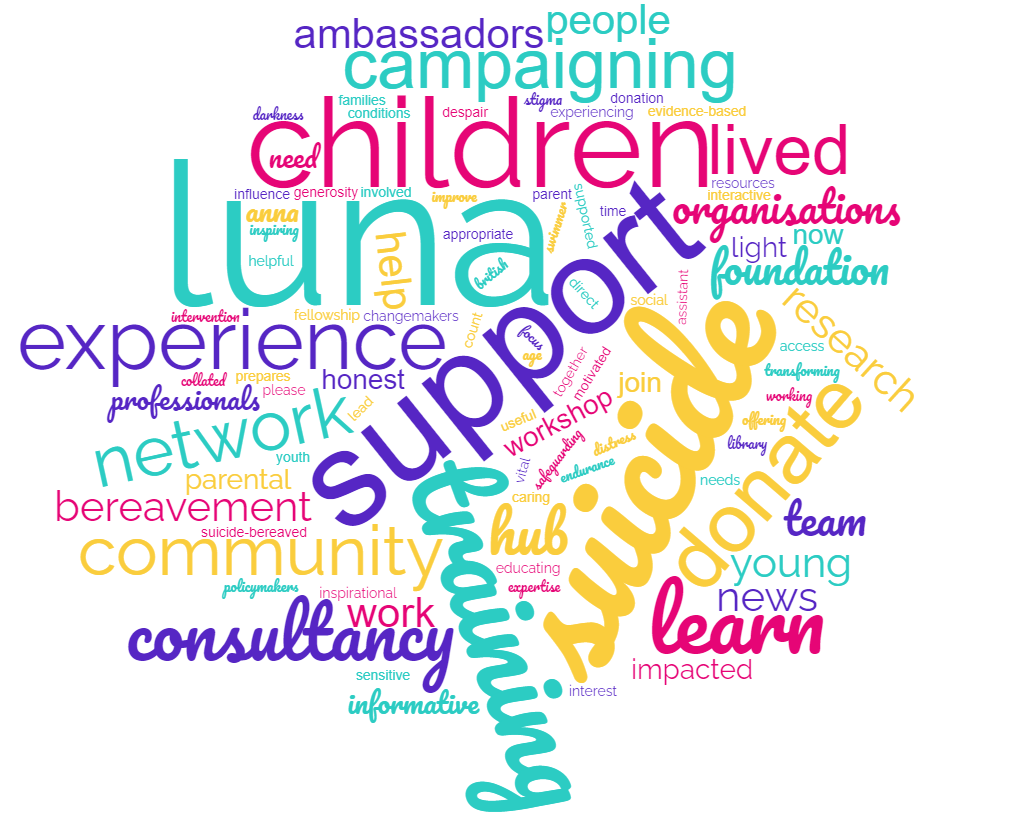
The language we use to talk about parental suicide
‘Sticks and stones may break my bones, but words will make me go in a corner and cry by myself for hours.’ Words are no laughing matter, according to Monty Python comedian Eric Idle, as he sums up why it is so vitally important for all of us to be mindful of the language we use.
A word or phrase you hear on a day when you’re feeling tender might land far more pointedly than on a day when you’re feeling strong. It applies not just to those grieving the loss of a loved one but in everyday life as well.
We know a lot of the language surrounding suicide can be really upsetting. It’s why you should always see or hear broadcasters issue a warning before a programme that refers to suicide. This allows you to choose whether to watch or listen and to prepare yourself for what you might see or hear. Responsible media outlets will never refer to the place or the way in which a person has taken their own life.
At Luna we do our absolute best to make sure we find the right words to talk about suicide bereavement, while also being aware that there will never be one single phrase that is right for everyone.
Our research and the workshops we have done with people who have lost a parent to suicide have, so far, suggested that plain speaking is something they would have really valued as a child.
When telling their story, many members of the Luna Lived Experience Network talk about when their parent ‘killed themselves’. This can sound jarring to someone who has not been in that situation, but it is simple, factual and not intended to pass judgement on the person who has died.
Evidence-based best practice also tells us that euphemisms to describe the death of a loved one aren’t helpful to the bereaved child. The concept of ‘suicide’ or ‘taking one’s own life’ can be tricky for some children to grasp. Simple, factual language can help a child understand what is happening. In time, this will help them to make sense of the death and grieve the loss without filling in the gaps with their own narrative, reducing the risks to their own mental health in the long term.
As a result, Luna always tries to use clear and unambiguous language.
We avoid using ‘commit’ when talking about suicide. It’s a word most often used in relation to crimes and sins. Using it is thought to reinforce the stigma surrounding suicide. Instead, we say ‘died by suicide’ or ‘has taken their own life’.
Similarly, we don’t talk about suicide as a ‘choice’. The ‘choice’ to die by suicide is not a choice in our normal understanding of the word. For someone in a suicidal state, it can feel like the only way to stop the unbearable pain of living. So, when you’re comforting a child who as lost a parent or carer to suicide, avoid saying ‘your mum/dad chose to end his own life’, as this can make them feel like it was a rational choice, which can add to their feelings of abandonment and, as a result, low self-worth.
Novelist Rudyard Kipling said, ‘Words are, of course, the most powerful drug used by mankind.’
What we say to a child when their parent has ended their own life can stay with them for a lifetime. Even if you feel angry or let down, talk about the person who died with compassion, as someone the child loves deeply.
We are in the process of developing resources for families to help children coping with the loss of a parent to suicide. In the meantime, please have a look at The Hub on our website for links to books and other information with a focus on supporting children and young people after suicide bereavement.

